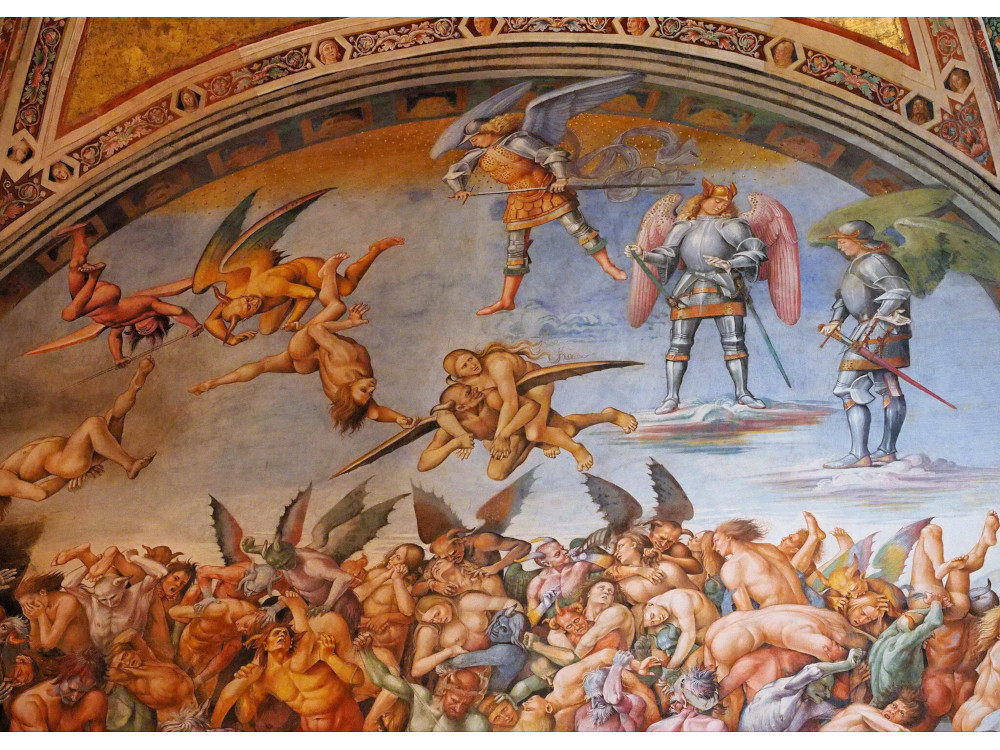Terry Mattingly via Religion Unplugged
(ANALYSIS) Forget the opinions of newspaper czars. The question many voters needed to know in this feverish White House race was simple: Who did Hell endorse?
Writing in the style of “The Screwtape Letters” by Christian apologist C.S. Lewis (in which a veteran tempter lectures lesser demons), Dominick Baruffi didn’t answer that question.
But his satirical lecture, “Screwtape Endorses a Candidate,” by the Infernal National Convention Chairman Gurtfoot stressed that this year’s options were truly hellish.
“Almost everything said in front of a camera is said for the purposes of being seen while saying it, and any policy has become entirely secondary to their celebrity,” wrote Baruffi, a Westminster Theological Seminary graduate who works as a counselor for troubled children.
Gurtfoot added: “What are the humans to do but either spend their time quarreling over choosing ‘the lesser of two evils’ or permit themselves to drift into apathy and ignorance? Of course, both are perfectly acceptable outcomes in our eyes. … If we can continue to produce candidates such as these two halfwits in the years to come, our victory is all but assured.”
But the main goal of the essay was not to slam the Republican and Democratic candidates. Instead, Baruffi focused on an issue discussed by insiders — whether the acid of recent elections has warped how Christians view politics.
With former President Donald Trump returning to the White House, progressive religious leaders will feel an immediate stab of disappointment. But believers on the left and right will soon have to face the fact that compromises are painful in a bitterly divided nation.
Thus, Baruffi’s proud tempter noted: “The modern man now sees politics as repugnant, wholly undesirable and certainly unable to be discussed reasonably with others. … This is a great victory for our kind. The less the humans are made to think of the IDEA of politics, the more isolated and fractured they become, thus making them more vulnerable to our advances.”
If millions of believers choose to flee politics, that will be tragic. Yes, there are believers who practice politics in “clumsy or malevolent ways,” notes Daniel Darling, director of the Land Center for Cultural Engagement at Southwestern Baptist Theological Seminary; but there have been “genuine American heroes whose faith drove them to the public square to eradicate evil.
“Consider what you’d lose if you removed all Christians from politics. You’d not have Martin Luther King’s drive for justice, nor William Wilberforce’s lifelong fight against the British slave trade, nor Susan B. Anthony’s crusade for woman’s suffrage,” he wrote at The Dispatch. “What’s more, as Father Richard John Neuhaus observed 40 years ago in his timeless book ‘The Naked Public Square,’ the receding of Christianity from public discourse will only leave a vacuum that other ideologies will fill.”
Nevertheless, debates will continue about the “lesser of two evils” realities at the heart of American politics, noted the Rev. David Roseberry, an Anglican whose church-life consulting group — LeaderWorks — is based in Plano, Texas. The bottom line: No matter what happens in specific elections, many believers feel like they are exiles in their own country.
“Let’s get honest about something. We are no longer in charge of our country as we thought we once were,” he wrote in his St. Arbuck’s Cafe Substack newsletter. “We’ve lost presence in nearly every public sphere. In most settings, we do not have the gavel. We do not control the purse strings. We do not write the textbooks. … What does this make us? Losers? Yes, we have lost our hold on society.”
Religious believers should remain active in politics, without surrendering to hubris or despair, said Roseberry, reached by telephone as the final election returns were announced. They will need to make hard choices while realizing that their “flawed, fallen” leaders will frequently let them down.
“I focus on the image that we have dual citizenship,” he said. “We are citizens of heaven. We are aligned with an embassy that is not of this world. We need to be active in this world and we can, and should, be active in politics. But our primary allegiance is elsewhere, and we must declare that. … Our flawed, fallen leaders won’t build the kingdom that we are often tempted to think that they can build.”
COPYRIGHT 2024 ANDREWS MCMEEL SYNDICATION
Terry Mattingly is Senior Fellow on Communications and Culture at Saint Constantine College in Houston. He lives in Elizabethton, Tennessee, and writes Rational Sheep, a Substack newsletter on faith and mass media.
Image Luca Signorelli’s ‘The Damned in Hell’, Orvieto. Image credit: Slices of Light/Flickr

